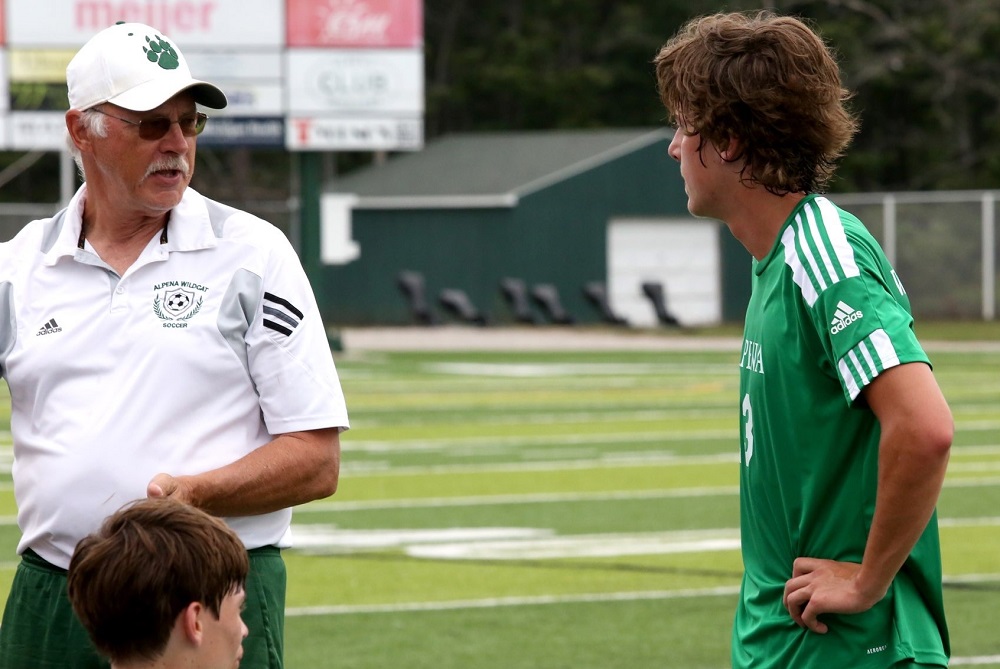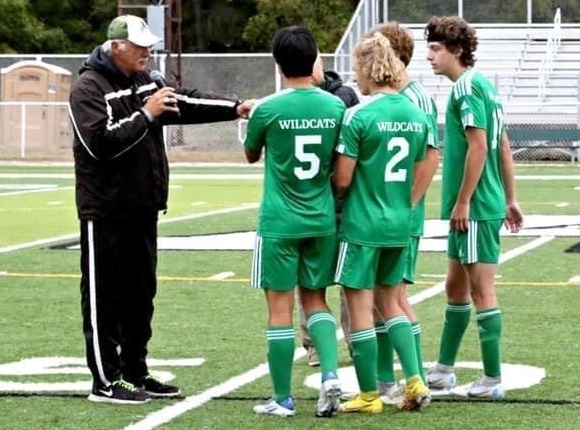
Thank Roosevelt for Football Weekends
December 20, 2013
By Rob Kaminski
MHSAA benchmarks editor
The next time you find yourself immersed in a tense crosstown football rivalry on a Friday night followed by a Saturday pilgrimage to the nearest college campus and a Sunday afternoon with a remote and your favorite snacks and beverages, take a moment to consider what the weekend would be like if it weren’t for Teddy Roosevelt.
The man who became our 26th President shortly after the turn of the 20th Century following the assassination of William McKinley in 1901 was a football fan like you. Maybe more so.
Today’s game of football has reached a critical crossroads. Player size and speed have increased across the board. Savage use of equipment as weapons rather than protective gear has been glorified on television networks and social media. Leaders of the game at all levels have recognized the need for change, employing new rules and widespread educational efforts to aid in preserving the sport.
History, as they say, is repeating itself.
In an ironic twist, it was Roosevelt who saved the then-brutally violent game of football from itself more than 100 years ago. Yes, the same “Rough and Ready Teddy” who led the charge up San Juan Hill during the Spanish-American War and often sparred in the boxing ring while in office from 1901-09 opined that football was becoming so gruesome that he delivered an ultimatum: clean up the game or it would be outlawed.
The Chicago Tribune reported that in 1904 alone, there were 18 football deaths and 159 serious injuries, mostly among prep school players. Football deaths suffered by younger players were reported on a nearly weekly basis, as outraged citizens called on colleges and high schools to banish football outright.
In stepped Roosevelt, who called head coaches and representatives from Harvard, Yale and Princeton – college powers at the time – to the White House in 1905 urging them to eliminate excessive violence and set an example of fair play for the rest of the country. When the casualties actually rose by one during the ensuing season, Roosevelt reacted with greater resolve and convened leading football authorities for the purpose of authoring drastic rules changes. What emerged was an intercollegiate conference which was the predecessor of the NCAA.
Among the most effective changes for the 1906 season were the legalization of the forward pass, the elimination of mass formations, and the creation of a neutral zone. Football fatalities fell to 11 in each of the next two seasons, and severe injuries fell drastically.
Thanks to the introduction of protective equipment and ever-evolving rules changes, football during the 100-plus years to follow has become an exponentially safer game. Yet, the game’s leaders always will need to adjust and react to scrutiny that comes with the territory.
So, as the game once again undergoes rules modifications in the name of safety, give a tip of the cap to President Roosevelt while you enjoy college bowl season and the NFL playoffs and begin to think ahead to the first high school practice of 2014.

Storch Returns to Retirement After Elevating Alpena Teams From Cellar to Contenders
By
Tom Spencer
Special for MHSAA.com
December 16, 2022
It wasn’t long ago that Alpena boys and girls soccer opponents took their long bus rides to play the Wildcats expecting an easy win, and most likely by securing the victory by the eight-goal differential rule, commonly known as the “mercy rule.”
 Worse yet, the Wildcats also had to take those trips across the northern part of the Lower Peninsula, as well as northern and southern journeys of two hours, dreading thoughts of experiencing yet another shortened game.
Worse yet, the Wildcats also had to take those trips across the northern part of the Lower Peninsula, as well as northern and southern journeys of two hours, dreading thoughts of experiencing yet another shortened game.
Those expectations started to change in 2011, when Tim Storch, arguably the most decorated coach in the history of Michigan high school soccer, took the reins of the Wildcats’ boys and girls programs.
Storch made the move after retiring from Troy Athens as a teacher and coach of the Redhawks’ boys and girls soccer teams.
Slowly but surely, Alpena’s mercy losses disappeared – and wins over their Big North Conference opponents became reality. Under Storch, the Wildcats went from the cellar to challenging for titles.
But now, Storch is showing some mercy on the Big North – perhaps an early Christmas present. The conference schools won’t see him on sidelines any longer. He’s retiring – again.
Storch is doing so after leading the Wildcats to wins over all conference opponents except Traverse City West. The Wildcats did get a tie this fall against the Titans, one of the BNC schools that regularly makes a deep postseason run, as Alpena stayed in the league title race most of the season.
“When I came to Alpena it was about trying to make the program relevant in the school, the community, the area, the BNC and northern Michigan,” Storch recalled. “We got to that point after some growing pains.
“Early on we took our lumps, and we were mercied by everybody,” he continued. “By the end we were competitive with everybody.”
Storch, who started the Athens soccer programs from scratch in 1981, won eight Class A or Division 1 Finals titles with the Redhawks. He’s near the top of the lists of the winningest boys and girls soccer coaches in the state. The last of his 1,109 wins was a 3-1 victory over Bay City Western during this fall’s postseason.
The Wildcats also beat conference opponent Cadillac in their District opener. They finished 14-6-3 on the season.
Storch will be dearly missed in Northern Michigan, veteran Petoskey boys and girls coach Zach Jonker pointed out. Jonker’s Northmen picked up a victory over Alpena in the Division 2 District Final – also Storch’s last game.
"Tim has had a legendary career as one of the most influential figures in Michigan high school soccer over the past 40 years while having an enormous impact on thousands of student-athletes,” Jonker said. “Over the past decade, Tim helped to dramatically raise the overall level of play in the Big North.
 “He is one of fiercest competitors I have ever coached against, but he is also one of the most genuine and empathetic coaches I have ever encountered,” Jonker continued. “I feel fortunate to have been able to build a competitive relationship with him and call him a friend."
“He is one of fiercest competitors I have ever coached against, but he is also one of the most genuine and empathetic coaches I have ever encountered,” Jonker continued. “I feel fortunate to have been able to build a competitive relationship with him and call him a friend."
Storch’s last game with the Alpena girls also was a District Final, a 3-0 loss May 31 to West.
Storch is proud of what the Wildcats accomplished, noting logistics — unlike in southeastern Michigan — were a big challenge.
“We were an island,” Storch said. “We were big school in the middle of nowhere.
“We couldn’t get together and have any kind of summer program with other communities because they didn’t have soccer, and if they had soccer they were at a Class D or C level that was way beneath what we were playing in the Big North.”
Storch’s tenure, which included six years serving as the Wildcats’ athletic director while coaching, drew accolades from his coaches and athletic directors. In addition to Jonker, Gaylord AD Christian Wilson, and West boys head coach and girls assistant coach Matt Griesinger gave high praise.
They are among those who will miss the successful coach.
“Tim leaves Alpena in better shape than when he arrived, and that is the true mark of a great coach and administrator,” Wilson said. “He has been an outstanding representative of Alpena High School, both as a soccer coach and as an athletic director.
“Tim brought a level of stability and expertise and was well-thought of by players, coaches, and community members.”
Griesinger, who has led the Titans to considerable postseason success and upheld BNC dominance since taking over the West program eight seasons ago, was particularly impressed with Storch’s energy and passion for his players evident in every match.
“Tim is one of the most respected coaches in the state, and what he has done for the soccer communities in both Troy and Alpena is not just commendable, but also something that every high school coach should hope to emulate,” Griesinger stated. “Storch is a stand-up guy, and all of us other coaches in the BNC should consider ourselves lucky that our journeys in the sport overlapped.”
Storch is leaving Michigan high school sports as they face a shortage of referees and qualified coaches. He’s not certain of the exact reasons for it, but he points to time constraints and pressures faced on and off the field.
And, he knows the days of a teacher starting a career, coaching sports and sticking with it are long gone.
“My wife has always said I was a dinosaur,” Storch said with a chuckle. “Back in my day, even if you had family and kids, you still made time for coaching.
“Coaching was part of my fiber — it kind of defined me.”
Storch is quick to point out “soccer coach” was just one of three hats he wore, along with history teacher and friend.
“I’m Mr. Storch to my students,” he recalls telling his student-athletes at Athens. “I’m Coach to my kids, and I am Tim to my friends.
“They are three different hats; I learned how to wear them and how to balance them.”
Storch looks back to all the friendships he’s made around the game of soccer – with former players, fellow coaches, and referees – with excitement for the future.
He is also keeping in mind former players, referees and coaches who have passed on.
“It is kind of humbling when I think back all the years (to) coaches, referees and players I have interacted with,” he said. “We’re all here for a finite time.
“We need to make the most of it and hopefully leave the place a better place when we leave.”
 Tom Spencer is a longtime MHSAA-registered basketball and soccer official, and former softball and baseball official, and he also has coached in the northern Lower Peninsula area. He previously has written for the Saginaw News, Bay County Sports Page and Midland Daily News. He can be reached at [email protected] with story ideas for Manistee, Wexford, Missaukee, Roscommon, Ogemaw, Iosco, Alcona, Oscoda, Crawford, Kalkaska, Grand Traverse, Benzie, Leelanau, Antrim, Otsego, Montmorency, Alpena, Presque Isle, Cheboygan, Charlevoix and Emmet counties.
Tom Spencer is a longtime MHSAA-registered basketball and soccer official, and former softball and baseball official, and he also has coached in the northern Lower Peninsula area. He previously has written for the Saginaw News, Bay County Sports Page and Midland Daily News. He can be reached at [email protected] with story ideas for Manistee, Wexford, Missaukee, Roscommon, Ogemaw, Iosco, Alcona, Oscoda, Crawford, Kalkaska, Grand Traverse, Benzie, Leelanau, Antrim, Otsego, Montmorency, Alpena, Presque Isle, Cheboygan, Charlevoix and Emmet counties.
PHOTOS (Top) Recently-retired Alpena soccer coach Tim Storch, left, talks things over with one of his players. (Middle) Storch, holding the microphone, elevated the Wildcats’ girls and boys programs since taking over both in 2011. (Photos courtesy of Therese Shaw.)

